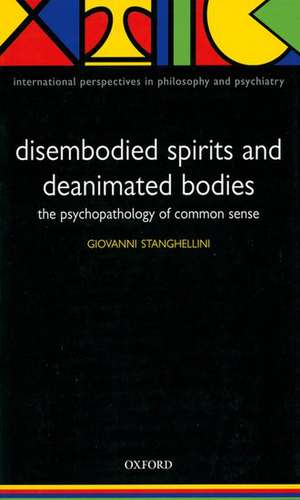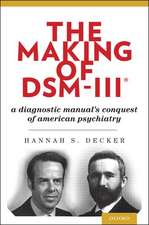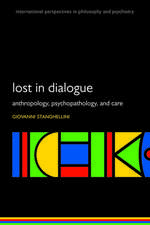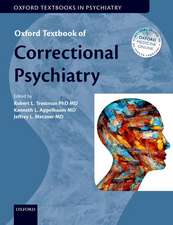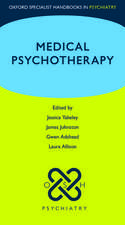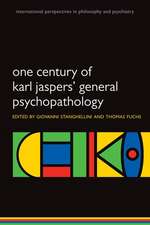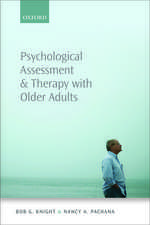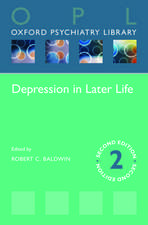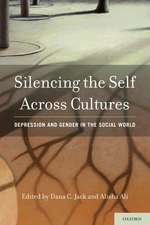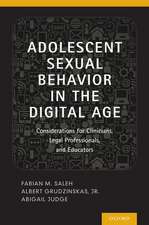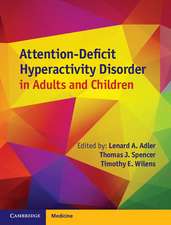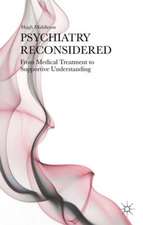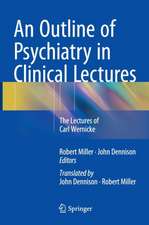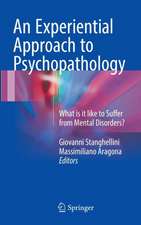Disembodied Spirits and Deanimated Bodies: The psychopathology of common sense: International Perspectives in Philosophy & Psychiatry
Autor Giovanni Stanghellinien Limba Engleză Paperback – 9 sep 2004
Din seria International Perspectives in Philosophy & Psychiatry
- 5%
 Preț: 552.58 lei
Preț: 552.58 lei - 13%
 Preț: 322.49 lei
Preț: 322.49 lei - 24%
 Preț: 542.84 lei
Preț: 542.84 lei - 23%
 Preț: 476.22 lei
Preț: 476.22 lei - 23%
 Preț: 543.69 lei
Preț: 543.69 lei - 23%
 Preț: 498.95 lei
Preț: 498.95 lei - 23%
 Preț: 544.39 lei
Preț: 544.39 lei - 24%
 Preț: 471.81 lei
Preț: 471.81 lei - 23%
 Preț: 413.41 lei
Preț: 413.41 lei - 23%
 Preț: 475.08 lei
Preț: 475.08 lei - 18%
 Preț: 364.04 lei
Preț: 364.04 lei - 18%
 Preț: 516.69 lei
Preț: 516.69 lei - 24%
 Preț: 458.13 lei
Preț: 458.13 lei - 23%
 Preț: 375.59 lei
Preț: 375.59 lei - 14%
 Preț: 327.50 lei
Preț: 327.50 lei - 27%
 Preț: 566.67 lei
Preț: 566.67 lei - 23%
 Preț: 465.20 lei
Preț: 465.20 lei - 28%
 Preț: 481.03 lei
Preț: 481.03 lei - 23%
 Preț: 383.99 lei
Preț: 383.99 lei - 28%
 Preț: 424.71 lei
Preț: 424.71 lei - 24%
 Preț: 540.23 lei
Preț: 540.23 lei - 27%
 Preț: 340.88 lei
Preț: 340.88 lei - 14%
 Preț: 560.55 lei
Preț: 560.55 lei - 22%
 Preț: 578.19 lei
Preț: 578.19 lei - 23%
 Preț: 365.13 lei
Preț: 365.13 lei - 41%
 Preț: 294.77 lei
Preț: 294.77 lei - 27%
 Preț: 341.49 lei
Preț: 341.49 lei - 27%
 Preț: 432.12 lei
Preț: 432.12 lei - 19%
 Preț: 413.64 lei
Preț: 413.64 lei - 14%
 Preț: 482.19 lei
Preț: 482.19 lei - 23%
 Preț: 510.02 lei
Preț: 510.02 lei - 20%
 Preț: 592.34 lei
Preț: 592.34 lei - 23%
 Preț: 442.80 lei
Preț: 442.80 lei - 19%
 Preț: 323.05 lei
Preț: 323.05 lei - 25%
 Preț: 522.30 lei
Preț: 522.30 lei - 19%
 Preț: 403.13 lei
Preț: 403.13 lei - 19%
 Preț: 456.39 lei
Preț: 456.39 lei - 23%
 Preț: 384.56 lei
Preț: 384.56 lei - 14%
 Preț: 495.37 lei
Preț: 495.37 lei - 19%
 Preț: 528.27 lei
Preț: 528.27 lei - 17%
 Preț: 475.11 lei
Preț: 475.11 lei - 14%
 Preț: 386.21 lei
Preț: 386.21 lei - 24%
 Preț: 381.69 lei
Preț: 381.69 lei - 23%
 Preț: 393.35 lei
Preț: 393.35 lei - 27%
 Preț: 327.31 lei
Preț: 327.31 lei
Preț: 541.08 lei
Preț vechi: 708.89 lei
-24% Nou
Puncte Express: 812
Preț estimativ în valută:
103.53€ • 108.39$ • 85.67£
103.53€ • 108.39$ • 85.67£
Carte tipărită la comandă
Livrare economică 26 martie-01 aprilie
Preluare comenzi: 021 569.72.76
Specificații
ISBN-13: 9780198520894
ISBN-10: 0198520891
Pagini: 208
Ilustrații: 2 line illustrations
Dimensiuni: 157 x 233 x 15 mm
Greutate: 0.37 kg
Editura: OUP OXFORD
Colecția OUP Oxford
Seria International Perspectives in Philosophy & Psychiatry
Locul publicării:Oxford, United Kingdom
ISBN-10: 0198520891
Pagini: 208
Ilustrații: 2 line illustrations
Dimensiuni: 157 x 233 x 15 mm
Greutate: 0.37 kg
Editura: OUP OXFORD
Colecția OUP Oxford
Seria International Perspectives in Philosophy & Psychiatry
Locul publicării:Oxford, United Kingdom
Recenzii
In this marvellous book, Stanghellini reinvigorates and resurrects psychopathology as more than just the listing of symptoms, re-presenting it as the 'science of the meanings of abnormal human phenomena' . . . The book, from the successful and influential OUP series International Perspectives in Philosophy and Psychiatry, is, like the others, a joy to read . . . All mental health professionals are likely to gain, both clinically and intellectually, from reading this book, and carers, patients and philosophers will find much to help them engage with the potentially disorientating and frightening reality of psychosis.
